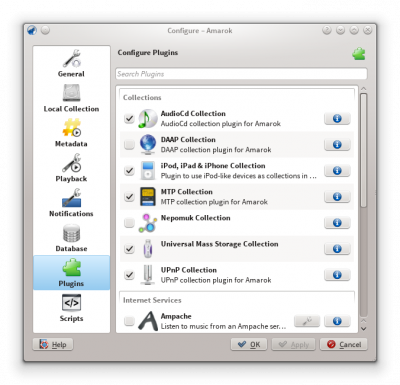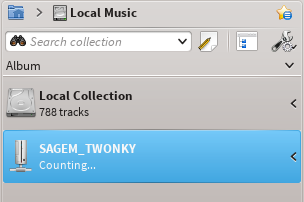Amarok/Manual/Organization/Collection/RemoteCollections/UPnP: Difference between revisions
m (Updated for 2.8) |
No edit summary |
||
| Line 10: | Line 10: | ||
<!--T:3--> | <!--T:3--> | ||
'''Amarok''' has a built-in UPnP media share client so it can play tracks shared on the network. To enable it, use <menuchoice>Settings -> Configure Amarok -> Plugins -> Collections</menuchoice> and check the box. When a media share is discovered it will be shown in '''Local Music'''. | '''Amarok''' has a built-in UPnP media share client so it can play tracks shared on the network. To enable it, use <menuchoice>Settings -> Configure Amarok -> Plugins -> Collections</menuchoice> and check the box by the '''UPnP Collection''' plugin. | ||
[[File:Amarok_2.8_UPnP_collection_plugin.png|center|400px]] | |||
When a media share is discovered it will be shown in '''Local Music'''. | |||
[[File:Amarok_2.8_UPnP_collection.png|center]] | |||
<!--T:4--> | <!--T:4--> | ||
Revision as of 11:16, 25 July 2013
Universal Plug and Play (UPnP) / DLNA
UPnP is a set of protocols to share media on the network. It is also supported by a wide range of residential gateways and Network Attached Storage devices. UPnP support is now commonly marketed as DLNA.
Amarok has a built-in UPnP media share client so it can play tracks shared on the network. To enable it, use and check the box by the UPnP Collection plugin.

When a media share is discovered it will be shown in Local Music.

The UPnP feature depends on KDE's UPnP media server support.
